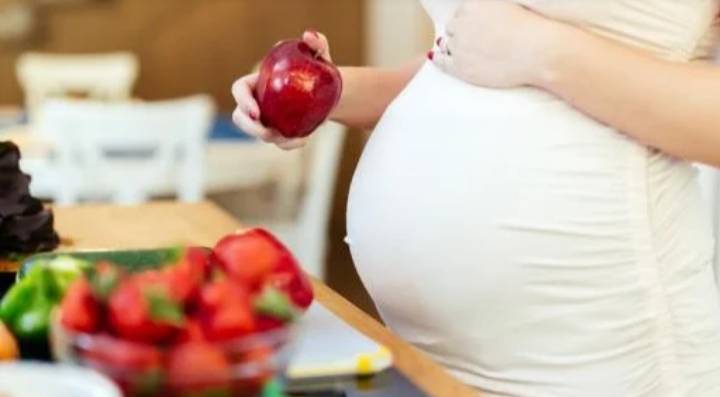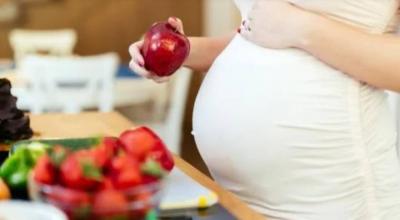During pregnancy, the mother is the sole source of nourishment for the fetus. Every nutrient needed by the fetus is consumed by the mother in her diet. How does the fetus receive its optimal nutrition? What are the components of reproductive health for women? The nutrition of pregnant women provides them with energy, allowing the fetus to grow naturally, healthily, physically, and mentally, while enabling the mother to adapt to her new pregnancy period and the postnatal and breastfeeding stages. Proper nutrition offers the mother health and energy during pregnancy to produce new tissues for herself and her fetus. This means that a diet is necessary to support these new tissues to meet the body's increasing need for energy to mobilize and strengthen it for physical activity. The mother's body mass increases significantly during pregnancy, necessitating additional energy for strong physical activities. Herein lies the value of food that provides the body with energy to align with pregnancy. However, energy consumption varies from one woman to another, making it essential to maintain an appropriate weight for each body to prevent excess body fat, salt, cholesterol, and other obstacles that can cause swelling and pain, threatening the health of the fetus that needs to grow rapidly and healthily in the mother's womb.
Pregnant women need proteins, which are vital for nourishing their bodies, minds, nerves, and bones, as they provide the necessary growth element for their tissues and the tissues of the developing child, as well as an increase in the mother's blood volume and the fluid surrounding the child. During pregnancy, the mother requires daily meals consisting of three to four protein-rich servings, such as meat, eggs, fish, milk and dairy products, cabbage, cauliflower, bananas, avocados, peanuts, soybeans, corn, coconuts, and nutrient-dense foods rich in vitamins. These foods produce complex tissues during pregnancy at a rate higher than at any other time in a woman's life, making proteins essential in such circumstances. The requirements for proteins cannot be separated from the requirements for calories and nutrients. Honey, soup, fruit juices, especially orange juice, dark leafy green vegetables, broccoli, and solid sweets provide pregnant women with the nutritional components that help both the mother and fetus gain strength and vitality, supplying both bodies with the nutritional value and calories inherent in the food consumed. Moreover, variety in diet and the consumption of legumes such as beans, chickpeas, lentils, bulgur, and peas, along with starchy foods like potatoes and rice in measured amounts, provide the body with energy and strength and facilitate digestion with the fibers they offer.
Additionally, pregnant women need calcium, vitamins, and minerals to maintain their reproductive health and the health of their fetus. Calcium is essential for the growth of bones and teeth, and minerals like iron are crucial for strengthening the blood of the pregnant mother and increasing the iron reserves for the fetus. Furthermore, folic acid plays a significant role in fetal cell development, and its deficiency can lead to congenital defects and deformities, which is why women who intend to conceive should consume foods rich in folic acid, such as vegetables and various legumes. Vitamins are also necessary for the health of both mother and child, so pregnant women should eat foods in moderation and according to their doctor’s recommendations.
It should not be forgotten that the pregnant woman experiences an increase in her blood volume and body fluids, which requires her to consume more fluids, possibly reaching ten cups of water, juice, or milk daily. However, she should avoid caffeine, which in large quantities can cause miscarriage, early birth, or delays in fetal growth. The further along a pregnant woman is in her pregnancy, the more she needs a larger quantity of water and a varied, balanced diet to provide herself and her fetus with the nutrients necessary to support rapid cell division and tissue growth.
Dear pregnant mother, enjoy your healthy diet to ensure a beautiful and smart baby. Your nutrition, rest, and happiness during pregnancy are vital for your well-being and producing a wonderful offspring. Rejoice because you are a nurturing and giving woman.
In conclusion, the question arises: how can a pregnant woman, who needs a variety of foods containing proteins, calcium, iron, folic acid, zinc, and pyridoxine, secure these necessities in such a poor economic situation in Lebanon? This implies that reproductive health in our beloved Lebanon is threatened by distortion and disruption because the pregnant mother cannot secure all the components necessary for her fetus's growth. Will the concerned parties recognize the risks posed by high prices and poor nutrition?




